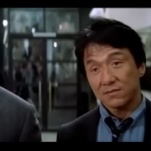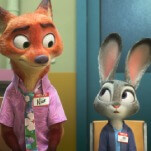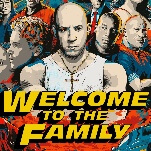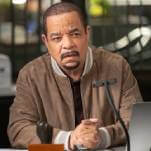First up, an apology. The relationship between a television critic and his readers relies on consistency and continuity. You need to be able to trust my voice, week in and week out. Since we’re embarking on a journey together, it’s important that we’re on the same page. In that respect, I have failed you. I’ve been on the road a lot, so I haven’t been able to write about many of the episodes of 30 Rock this season. Other writers have done fine work in my absence. I wish I could say the same for myself. I fell down on the job. I apologize for that. You have let me know in the comments that you are unhappy with my performance. I can take that hit. Some of you have also angrily insisted that the job I’ve done here instantly negates anything I may have achieved personally or professionally. That, I find a little harsh.
30 Rock was created in the unbearable heat of the media spotlight. It was a news story well before it hit the air. First, the story was Studio 60 On The Sunset Strip versus 30 Rock. It was the stuffy, self-serious, pompous boobs over at Studio 60 versus the irreverent young turks on 30 Rock. It was Sorkin versus Fey, comedy treated as a sacred calling on the level of medicine or science versus comedy as something profoundly fucked-up people somehow manage to do between crying jags and nervous breakdowns.
Nothing disabuses an idealist of romanticized ideas about an institution quite like experiencing it firsthand. It’s easy for Sorkin, as an outsider, to look at an institution like Saturday Night Live and see fearless satirical heroes devoted to exposing our hypocrisy and insecurities. From the inside, those fearless satirical heroes look an awful lot like drunken, drugged-up lunatics, who are often the worst conceivable guardians of the talent they’ve been given.
30 Rock was big news before it even came out. It mattered to the media and to comedy geeks in a way few television shows did before. It was about us! It was about the media! It was about a writer! And it was the brainchild of Tina Fey, whose reputation as a comic genius wasn’t entirely justified by her long stint as Head Writer of Saturday Night Live.
First, 30 Rock vanquished Studio 60. It wasn’t even close. The scrappy underdog slew the lumbering beast and became a critical darling. There are few people in the world less secure than fans of offbeat, smart television comedy. We understand intuitively that everything we love will be taken from us. We approach each new show with the lingering scars left by Arrested Development and Freaks & Geeks and The Critic. The equation seems simple: If we love something, it will go away.
We loved 30 Rock, so we were convinced that unless we campaigned actively for it, Tina Fey’s brainchild would join many of the rest of our favorite shows in the big television graveyard in the sky, alongside other masterpieces too beautiful, too pure, and too genius for the vast wasteland of our airwaves.
Thus, 30 Rock has always been in a terrible hurry. It’s been under enormous pressure from the very beginning to justify the critical adoration heaped at its feet and maintain a level of pop-culture heat that’s hard to maintain over the course of a single season, let alone five. And, of course, it was under enormous pressure to deliver ratings.
It’s never been enough for 30 Rock to be merely a funny show. No, it had to dazzle to prove itself worthy of the breathless encomiums directed its way. Funny was never going to be good enough. Good was never going to be good enough. That pressure manifested itself in a never-ending array of guest stars, each more dazzling than the last. For a while it seemed as if no guest was out of 30 Rock’s reach, that they could get fucking J.D Salinger to pop in for a quick cameo the next time he visited New York.
For much of its run, 30 Rock has been able to both live with the incredible pressure on it and live up to the hype that has been its constant companion. In season four, 30 Rock sagged under the pressure to live up to its reputation, its past, and audience expectations. 30 Rock wasn’t going to be allowed to grow old gracefully. It’s too manic and in the moment for that.
The growing pains hit hard during that fourth season. The show devolved into self-parody. It had never been afraid to go broad for laughs, but brash broadness became its default tone. The show had always been manic and quick, but the frenetic exertion began to feel desperate. The show opened up the writers' room only to discover that a little of Toofer or Frank can go a long way. 30 Rock began to sag under the enormous pressure of simply being 30 Rock.
30 Rock found its footing in its fifth season. As I wrote earlier, it would never be allowed to grow old gracefully, but it has at least aged into a show that no longer feels such a desperate need to impress. For all its busyness, it feels a little more comfortable in its own skin.
Fey’s brainchild needs a baseline level of chaos in order to operate. It’s like one of those people who need to experience danger just to feel alive. So even in a fifth season that found the cast and crew settling into a good, comfy groove, it still felt the need to be newsworthy.
So it went live. It was once again setting the bar for itself prohibitively high. How would a show that thrives on blinding speed and machine-gun editing adapt to the slower pace and different performance demands of live television? Would it be the same show?
I hesitate to write too much about the live show because Todd VanDerWerff, our television editor and an infinitely better television writer than myself, really liked it, and I respect his opinion and judgment tremendously. For me, it represented all the faults of the fourth season in highly concentrated form. Playing to a live audience encouraged the cast, the vast majority of whom have extensive live experience, to go big and broad and play to the cheap seats. The characters, in turn, became bigger. There seemed to be an awful lot of furious exertion without much in the way of payoff. It almost seemed as if the show was implicitly saying, “Aren’t you glad we don’t still feel the need to try this hard every week?” I know I was.
As a physical performance, the live episode represented a tremendous accomplishment. Creatively, I felt like it was a giant step backwards, as was the conceptual episode devoted to a faux Real Housewives show featuring Tracy Jordan’s wife. At first, I thought it was a throwaway gag, then I thought it was a conceptual bit that went on way too long before I realized that this wasn’t a gag; this was the whole episode. It’s admirable that 30 Rock is still willing to take chances like that, but it's not necessary.
As I wrote earlier, 30 Rock thrives on the edge of chaos. It’s comfortable on the precipice of disaster. 30 Rock has lived on that uncertain locale for years now. Every successful television show has many moving parts but two of 30 Rock’s are especially combustible: When two-thirds of the core of your show (that would be Tracy Morgan and Alec Baldwin)seems in constant danger of either leaving or losing what’s left of their minds at any given moment, an already loaded situation becomes borderline impossible.
As Liz says on "Respawn", "chaos is my normal." The season finale was all about finding and maintaining a level of containable, sustainable madness that allows everything to just barely work until the next crisis. Liz understands this intuitively, yet she still affords herself the illusion that life could be something more than just staving off tragedy.
Liz has plans for the summer that will finally allow her to become the woman she's always wanted to be—a woman who wears flowy garments outside while drinking white wine—instead of the neurotic she actually is. Liz wants to escape the prison of self, only to discover that that’s an impossibility.
As befits an episode named "Respawn," this was filled with characters who wanted to be something other than what they are, who want desperately to slip out of their own skin. For Liz, that means being the kind of woman of leisure who can actually enjoy a summer without working through it. For Jenna and her doppelganger/boyfriend, that meant adopting a crude facade of heteronormativity for the benefit of the conservative souls behind the wool council that has the questionable judgment to want to get into bed with Jenna, professionally speaking.
Jack doesn't want to be anything he's not. Why would he? But he cannot accept Avery’s absence, so he attempts to transform Kenneth into Avery’s double. Kenneth has a bottomless tolerance for humiliation. It takes an awful lot to creep him out, but the lascivious, hopeful gleam in Jack's sad eyes as he gazes on a piss-poor substitute for his beloved wife clearly did the trick. I found the Kim Jong-Il subplot to be a regrettable return to the bigness of season four, but I find Jack's love for Avery touching. He is a rock, an island. He's habitually averse to doing anything that might render him vulnerable, but his need for Avery renders him ingratiatingly human, even weak.
Even Kenneth has his limits, however, so there is a turn where Kenneth decides that if Jack really wants Avery, he'll give him just that. Kenneth knows Avery hates weakness, and there's something weak and sad about a god among men trying to create a second perfect spouse out of the crude clay of an effeminate Southerner. Kenneth's body language and voice undergo a startling transformation when he channels Avery. And he's definitely channeling Avery when he gives Jack a richly merited tongue-lashing.
Kenneth has to act to be aggressive or mean. It doesn't come naturally. The same is true of Paul/Tomas. Will Forte is such a convincing cross-dresser (an ambiguous compliment, to be sure) that it's startling seeing him in men's clothes. For Paul/Tomas it takes enormous internal strength to adopt even a flimsy facade of masculinity for even a night. I especially liked how he choked out the news that he was all about "golf-playing."
Liz tries to leave the old, stuffy Liz behind, but she can't do that anymore than she can change her DNA. The typical sitcom dynamic is for a show to start normal, encounter chaos, then return to a state of normality by the end. On 30 Rock, it's more about returning to a state of sustainable chaos, a state of acceptable abnormality. For Liz, that means giving up a cliche woman's dream vacation for its bizarro-world antithesis: getting fresh air, exercise, and Spanish lessons from the Hispanic guards watching her while she performs heavenly, heavenly hours of community service.
30 Rock has been on the air for a very, very long time. This season was a return to form for the show, but it's showing its age a little and getting a little loopy and loose, even without a gas leak involved. The closing bit with Kenneth tonight was a puzzler by design, as was the "To be continued" cliffhanger. Everything seems to be in play at this point on 30 Rock. It's reached a point where it can relax a little, where we can spend a little leisurely time with characters we've come to know and love without racing off to the next guest star or wacky plot twist.
No show can be the hot show forever. Heat fades, but great TV endures. So if Community and Parks & Recreation make 30 Rock seem a little pokey or stale by comparison (Community, in particular, has mastered the pop-culture references and meta-textual post-modern riffing that Tina Fey's brainchild is famous for) these days, 30 Rock enjoyed a nice run ss the show everyone was talking about. Congratulations, 30 Rock. You've made it five seasons and over 100 episodes. You can relax a little now. The pressure is off. Or at least it should be.
Stray observations:
- "God, are you punishing me because my hair is better than yours?"
- I was excited by the return of Dr. Spaceman. Such a great character, and he's never worn out his welcome
- "Sounds like you could use a little R & R: Rum and Ritalin.
- I love that Toofer calls him "David Eggers"
- "I'm wearing a diaper, like a baby would."
- "The voice is controlling me. Help me?"
- "I could hardly drink my morning shower scotch."
- "I can be a normal person. I have to blow myself up."
- I enjoyed the very theatrical way Liz stressed the "dis" in "This is a sham, your dishonor.
- "Gavel, gavel, gavel! I lost my gavel!"
- "Can I borrow a cup of sugar? I want a hummingbird to drink from my penis?"
- "I like to replace the union soldier meat with potatoes."
- So, was that last shot a game-changer or a non-sequitur? Kenneth is a bit of an odd duck.









































